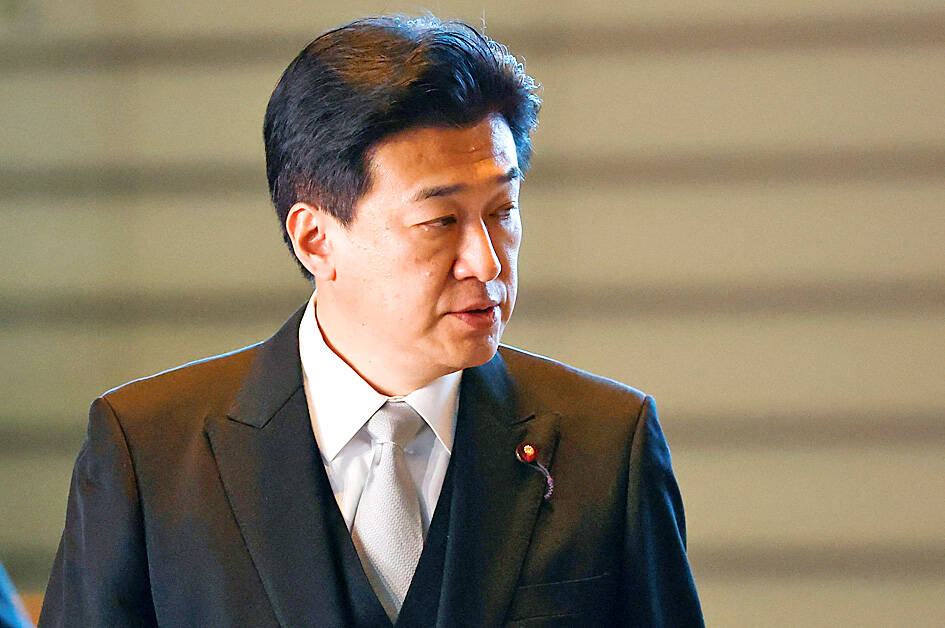Japanese Prime Minister Fumio Kishida has appointed as defense minister a politician who has worked to build ties with Taiwan, yesterday’s new Cabinet lineup showed.
The choice spotlights a stronger line on defense as Kishida battles sagging ratings with his term as leader of the ruling Liberal Democratic Party (LDP) set to end next year.
Japanese Chief Cabinet Secretary Hirokazu Matsuno said the role of minister of defense went to Minoru Kihara, a pro-Taiwan politician who has visited the nation and belongs to a Japan-Taiwan inter-parliamentary group.

Photo: Reuters
Kihara would oversee the bolstering of Japan’s military as part of a plan to double defense spending by 2027. He would have to solve the question of how to fund that buildup amid rising tensions in the region over China’s military expansion and maritime disputes.
Takashi Kawakami, a security expert and professor at Takushoku University in Tokyo, said the choice of Kihara as defense minister “isn’t an anti-China move, but it does indicate a closeness with Taiwan.”
“I do think this sends a message that Japan is seeking stability in Taiwan alongside the United States,” he said.
However, one political commentator said that such ministerial roles had diminished in importance in favor of dialogue with China at the highest levels.
“Around the world, summit diplomacy has become the mainstream,” said Shigenobu Tamura, who previously worked for the LDP. “Even if the foreign and defense minister posts change, there won’t be any change or impact on Japan’s diplomatic policy.”
The Cabinet shuffle comes as Kishida, who assumed office two years ago, has seen his popularity dip in recent months after a string of scandals, including data mishaps linked to government ID cards and the arrest of a vice minister under suspicion of bribery.
In related news, Japan has appointed a serving government official to act as its de facto defense attache in Taiwan, four sources said, elevating security ties in a move likely to anger China.
Japan handles bilateral relations through the Japan-Taiwan Exchange Association in Taipei, which is chiefly staffed by reassigned foreign and trade ministry officials. The defense attache role has until now been held by a retired Japan Self Defense Force officer to avoid antagonizing China.
He has been joined by an official dispatched by the Japanese Ministry of Defense to enhance information gathering and communicate with Taiwan’s military, said the sources, who asked not to be identified because of the sensitivity of the issue.
It is also “symbolic” of Japan’s support for Taiwan, said one of the people who know about the appointment. “Taiwan had been asking for an active duty defense official to fill the post.”
Highlighting Tokyo’s nervousness about Beijing’s reaction, the move was halted last year after a Japanese media report about the plan, the sources said.
The Japanese Ministry of Defense said that it would only pursue “non-governmental” ties with Taiwan.
In Taipei, the Ministry of Foreign Affairs declined to comment when asked about the new defense attache, but said it “would continue to deepen cooperation with similar-minded partners such as Japan.”
See Japanese on Page 5

SECURITY: As China is ‘reshaping’ Hong Kong’s population, Taiwan must raise the eligibility threshold for applications from Hong Kongers, Chiu Chui-cheng said When Hong Kong and Macau citizens apply for residency in Taiwan, it would be under a new category that includes a “national security observation period,” Mainland Affairs Council (MAC) Minister Chiu Chui-cheng (邱垂正) said yesterday. President William Lai (賴清德) on March 13 announced 17 strategies to counter China’s aggression toward Taiwan, including incorporating national security considerations into the review process for residency applications from Hong Kong and Macau citizens. The situation in Hong Kong is constantly changing, Chiu said to media yesterday on the sidelines of the Taipei Technology Run hosted by the Taipei Neihu Technology Park Development Association. With

CARROT AND STICK: While unrelenting in its military threats, China attracted nearly 40,000 Taiwanese to over 400 business events last year Nearly 40,000 Taiwanese last year joined industry events in China, such as conferences and trade fairs, supported by the Chinese government, a study showed yesterday, as Beijing ramps up a charm offensive toward Taipei alongside military pressure. China has long taken a carrot-and-stick approach to Taiwan, threatening it with the prospect of military action while reaching out to those it believes are amenable to Beijing’s point of view. Taiwanese security officials are wary of what they see as Beijing’s influence campaigns to sway public opinion after Taipei and Beijing gradually resumed travel links halted by the COVID-19 pandemic, but the scale of

A US Marine Corps regiment equipped with Naval Strike Missiles (NSM) is set to participate in the upcoming Balikatan 25 exercise in the Luzon Strait, marking the system’s first-ever deployment in the Philippines. US and Philippine officials have separately confirmed that the Navy Marine Expeditionary Ship Interdiction System (NMESIS) — the mobile launch platform for the Naval Strike Missile — would take part in the joint exercise. The missiles are being deployed to “a strategic first island chain chokepoint” in the waters between Taiwan proper and the Philippines, US-based Naval News reported. “The Luzon Strait and Bashi Channel represent a critical access

Pope Francis is be laid to rest on Saturday after lying in state for three days in St Peter’s Basilica, where the faithful are expected to flock to pay their respects to history’s first Latin American pontiff. The cardinals met yesterday in the Vatican’s synod hall to chart the next steps before a conclave begins to choose Francis’ successor, as condolences poured in from around the world. According to current norms, the conclave must begin between May 5 and 10. The cardinals set the funeral for Saturday at 10am in St Peter’s Square, to be celebrated by the dean of the College